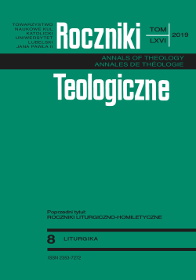Odnowa kultury muzycznej Kościoła lubelskiego w czasach posługi biskupiej Stefana Wyszyńskiego
Abstrakt
W niniejszym artykule autor zaprezentował proces odnowy kultury muzycznej Kościoła lubelskiego tuż po zakończeniu II wojny światowej. Zebrane źródła wskazują na postać bpa Stefana Wyszyńskiego, który jako ordynariusz diecezji okazał się być odważnym inspiratorem, podejmującym szereg działań na rzecz odbudowania właściwego poziomu życia liturgicznego w diecezji lubelskiej. W celu realizacji przyjętych założeń bp Wyszyński stworzył realne możliwości podnoszenia kwalifikacji zawodowych muzyków kościelnych, a tym samym wywołał proces uczenia wiernych nowego repertuaru liturgicznego oraz korektę błędów natury muzycznej, jak i teologicznej w pieśniach już wcześniej używanych. W naturalny sposób na poziom kultury muzycznej w diecezji lubelskiej miały wpływ renowacje wielu starych instrumentów, jak też budowa nowych organów. Troska o muzykę kościelną bpa Wyszyńskiego przejawiała się również w godnych podziwu (jak na trudne czasy powojenne) decyzjach o sposobach finansowania zatrudnionych pracowników Kościoła.
Zaprezentowane materiały dotyczące problematyki muzyki kościelnej w latach 1946-1948 na terenie diecezji lubelskiej pozwalają stwierdzić, że za sprawą bpa Stefana Wyszyńskiego uczyniono bardzo wiele, aby realnie oddziaływać na poziom kościelnej kultury muzycznej. Do dzisiaj, po siedemdziesięciu latach, należy wskazać tamte działania jako niedościgniony wzór.
Bibliografia
Czaczkowska Ewa K., Kardynał Wyszyński. Biografia, Kraków: Wydawnictwo Znak 2013.
Kronika Muzyczna Organistów Diecezji Lubelskiej, „Wiadomości Diecezji Lubelskiej” 24 (1947), s. 154-159; 254-258; 341-346; 439-442.
Kronika Muzyczna Organistów Diecezji Lubelskiej, „Wiadomości Diecezji Lubelskiej” 25 (1948), s. 461-471.
Efner Bogumił, Aktualne potrzeby muzyki kościelnej w Polsce, „Wiadomości Diecezji Lubelskiej” 24 (1947), s. 243-246.
Kaczorek Józef, Chełm, parafia Mariacka – poświęcenie organów, „Wiadomości Diecezji Lubelskiej” 24 (1947), s. 440-441.
Koszowski Stanisław, Czy obowiązują nas przepisy Motu Proprio o muzyce kościelnej?, „Wiadomości Diecezjalne Lubelskie” 25 (1948) s. 461-463.
Lisiecki Tomasz, Biskup Marian Leon Fulman jako inspirator odnowy muzyki religijnej w diecezji lubelskiej, w: Pater Ecclesiae Lublinensis. Studia w 65. rocznicę śmierci biskupa Mariana Leona Fulmana (1866-1945), red. Jarosław R. Marczewski, Lublin: Wydawnictwo Archidiecezji Lubelskiej „Gaudium” 2010, s. 235-248.
Marczewski Jarosław R., Powojenne losy biskupa Mariana Leona Fulmana, w: Pater Ecclesiae Lublinensis. Studia w 65. rocznicę śmierci biskupa Mariana Leona Fulmana (1866-1945), red. Jarosław R. Marczewski, Lublin: Wydawnictwo Archidiecezji Lubelskiej „Gaudium” 2010, s. 293-314.
Ochalski Marian, Organista i jego praca, „Wiadomości Diecezji Lubelskiej” 24 (1947), s. 255-256.
Podobiński Piotr, Organy, „Wiadomości Diecezji Lubelskiej” 6 (1947), s. 256.
Pylak Bolesław, Biskup lubelski Stefan Wyszyński jako duszpasterz w świetle protokołów wizytacji parafialnych, Lublin: Lubelskie Wydawnictwo Archidiecezjalne 1996.
Wilkowski Eugeniusz, Dzieje chóru na tle życia parafii Rozesłania Świętych Apostołów w Chełmie w latach 1918-2018, Chełm: Arte Michał Bechta 2018.
Wyszyński Stefan, Rozporządzenie o wynagrodzeniu organistów i służby kościelnej, „Wiadomości Diecezji Lubelskiej” 24 (1947), s. 457-459.
Wyszyński Stefan, W sprawie kolend organistowskich w Adwencie, „Wiadomości Diecezji Lubelskiej” 24 (1947), s. 100.
Copyright (c) 2019 Roczniki Teologiczne

Utwór dostępny jest na licencji Creative Commons Uznanie autorstwa – Użycie niekomercyjne – Bez utworów zależnych 4.0 Międzynarodowe.





